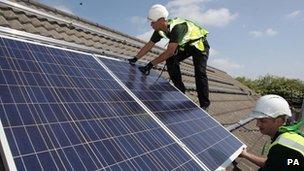Friends of the Earth legal action over solar subsidy
- Published

The government said the changes would ensure the scheme carried on in future
Environmental charity Friends of the Earth is to take the government to court over plans to halve subsidies for households which install solar panels.
The charity said it had written to the government and asked it to agree to amend its proposals by Friday, but said it received only a "holding response".
It comes after the CBI criticised the government's decision to halve the "feed-in tariffs" earlier than planned.
The government said it would defend the challenge at judicial review.
"We're consulting on proposed new tariffs for a reason - to protect consumers from footing the bill for excessive subsidies," a spokeswoman said.
Under the "feed-in tariffs" programme, people in Britain with solar panels are paid for the electricity they generate.
The new tariff of 21p per kilowatt-hour, down from the current 43p, will take effect from 1 April, but in October the government said it would be paid to anyone who installs their solar panels after 12 December.
Friends of the Earth argues this cut-off point - two weeks before Department of Energy and Climate Change (DECC) consultation, external on changes to the scheme ends - is unlawful.
Its policy and campaigns director Craig Bennett said: "Ministers have failed to listen to our concerns about the legality of its plans to slash solar subsidies - we have now been left with no choice but to take the government to court.
"Slashing payments to any scheme completed after 12 December will unfairly pull the plug on thousands of clean energy schemes across the UK, preventing homes and communities from escaping soaring fuel bills.
"Ministers have pulled the rug from under the feet of one of the few areas of the economy that is creating new jobs - and completely undermined business confidence in clean energy."
'Job losses'
FoE added that it has evidence that projects are already being abandoned and solar firm redundancies have either taken place or are being urgently considered.
Earlier on Friday, the CBI said the decision to halve feed-in tariffs earlier than planned would force companies to cancel planned work, destroying projects and jobs.
Labour's shadow environment secretary Caroline Flint told the BBC the government was in danger of killing the renewables industry.
"It worries me that in just a year, we have gone from third place to 13th place behind Brazil and India in terms of investment in renewables and this is an industry - the solar industry - which has been hugely successful: 25,000 jobs, 39,000 if you add in the ones in the supply chain, that is being put at risk," she said.
'Enduring future'
The government's decision has already been criticised by the Local Government Association, which warned it would cost councils who had attempted to roll out the technology to poorer households hundreds of millions of pounds.
The DECC, which also faces a possible legal challenge over the plans from lawyers acting for installers, says it is altering the scheme to ensure an "enduring future" for the industry.
It argues that under the current situation the scheme's budget would be "eaten up entirely", causing greater problems for firms and employees.
It launched the public consultation on plans to slash the subsidy in October and says it will remain open for comment until 23 December.
- Published11 November 2011